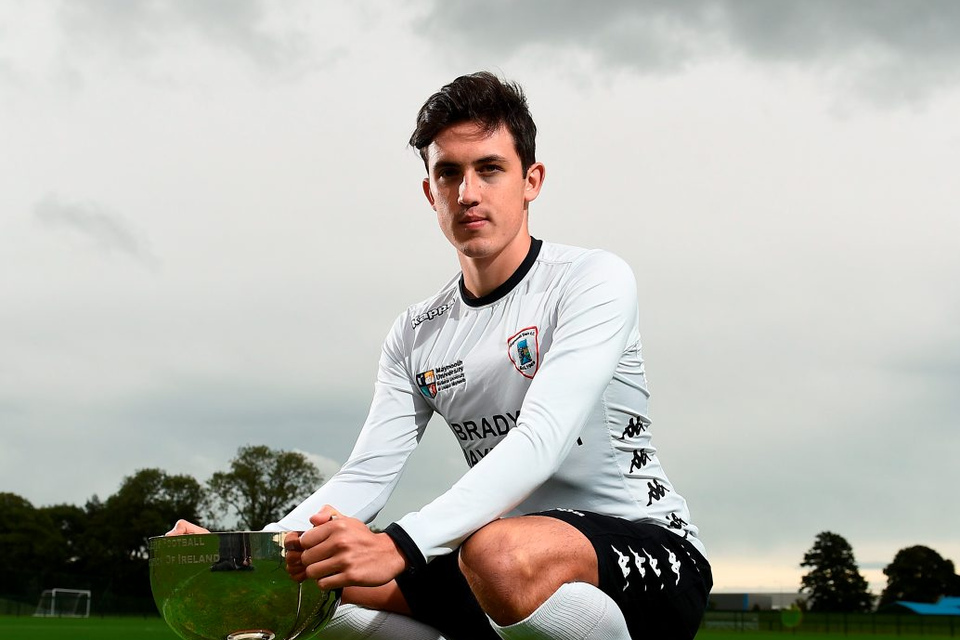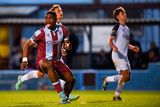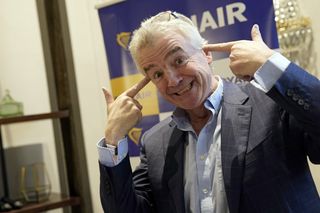Daniel McDonnell: Third-level options have to be part of any long-term plan for League of Ireland
Jamie McGrath, pictured at the launch of the FAI Third Level Season, has benefitted from Pat’s partnership with NUI Maynooth. Photo: Sportsfile
When Niall Quinn floated the ambitious idea of packaging the League of Ireland for sale to foreign television markets, he stressed the importance of presentation.
It's a no-brainer really. Ugly or empty stadiums do little for the brand, and the problem in this league is that a large number of clubs suffer from both of those problems. This is just one of the reasons why Quinn's plan was treated in some quarters with a weary brand of derision.
Where would you start? Turn on Soccer Republic of a Monday evening and you'll find the evidence of neglect and/or apathy at both ends of the table. At least the competitors battling it out for honours tend to have people there to cover over the cracks.
If a facility-based revolution ever happened, there would be no room for Wexford Youths until their pitchside amenities improved beyond a ground-level camera view.
Shane Keegan has done remarkable work at Ferrycarrig Park with an amateur squad and the Premier League debutants have off-the-pitch features at their base that are superior to what long-term league members function with.
But the images of their sparsely attended home matches - the locals have not been attracted to the inconveniently located ground - would not enhance any montage selling the product.
Wexford are there on football merit. The diehards will understandably take exception to being singled out.
The small bunch of regulars affiliated with UCD will know how they feel. For many years, they were the top flight side that didn't belong in the 'ideal world' scenario.
A Premier Division club with support that can only be measured in hundreds is never going to be included in a masterplan.
And yet, cutting the students out of the future risks underestimating their contribution to the league's good news stories. The Belfield footprint is everywhere.
The point was well made by ex-UCD defender David O'Connor - now of Shamrock Rovers - in a piece he wrote for extratime.ie last week. He homed in on a game from September 2009, a 5-0 win for UCD away to Finn Harps as they dominated Division One en route to gaining promotion.
The goalscorers that night included Ronan Finn, David McMillan and Ciaran Kilduff, three key members of Dundalk's European adventure.
Andy Boyle was also a part of that squad. So too was Greg Bolger, who is arguably now the most influential member of the Cork team that is trying to chase down the Lilywhites at the top of the Airtricity League table.
That's only a small sample of the UCD graduates spread around the podium contenders. Dundalk brought in high academic achiever Robbie Benson for this year after the Athlone lad spent five years in Dublin 4 mixing his interests.
With the major schoolboy nurseries losing their players in their late teens and the top League of Ireland operations only belatedly embracing their underage set-up because of the new U-19 and U-17 leagues, UCD has functioned as the closest thing to a finishing school for youngsters with potential.
Given that Irish football's greatest source of shame is that it sends kids to England conscious that a good number of them will end up with nothing if it doesn't work out, an avenue that allows them to play a good level of football and gain some qualifications ticks the boxes.
Third-level football is growing in Ireland and it goes beyond UCD: 86 current Airtricity League players will also be lining out for a college team in the new season that was launched last Wednesday.
Clubs have struck up mutually beneficial partnerships that have worked well for all parties. St Patrick's Athletic's relationship with Maynooth has helped along rising stars Sean Hoare, Jamie McGrath and others.
In other parts of the country, it's not as straightforward. At a point where questions are being asked about the long-term structure, especially as regards the ailing First Division, there is support for a one-team league with a new regionalised structure below it.
In that event, a possible role for expanding third-level institutions would be an obvious starting point in exploring a fresh pyramid scheme feeding towards a central purpose.
UCD will always have a part to play. Collie O'Neill's class of 2016 are knocking on the door seeking promotion again. They do have players from outside but retain that core group of youths learning the game while setting themselves up for a life outside it.
With some players based on campus, they inhabit an environment which allows them to see more of each other than some established semi-pro teams.
They continue to produce talented players. Last month, promising midfielder Dylan Watts earned a move to Leicester.
The transient student body have never flocked to watch potential. They don't exactly turn out in force to watch emerging rugby names that are part of Ireland's U-20 squad either. Nor do they rally behind established intercounty GAA players who wear the college colours in that code.
O'Neill's side are set for another First Division play-off where their presence will raise questions about what they would offer in the event of them making the leap.
It's true they will never fit a marketing department's vision of where the league needs to go.
But their role in Dundalk's shop window achievements highlights their ongoing importance to the bigger picture.















